Organizational Behavior on Apple
VerifiedAdded on 2023/06/11
|11
|3219
|177
AI Summary
This report covers the case of managerial culture, power and politics, theories of motivation, effective and ineffective groups and so on in relation to Apple. It also discusses factors that make an effective team as opposed to an ineffective team. The report applies concepts and philosophies of OB, including the Path Goal Theory.
Contribute Materials
Your contribution can guide someone’s learning journey. Share your
documents today.
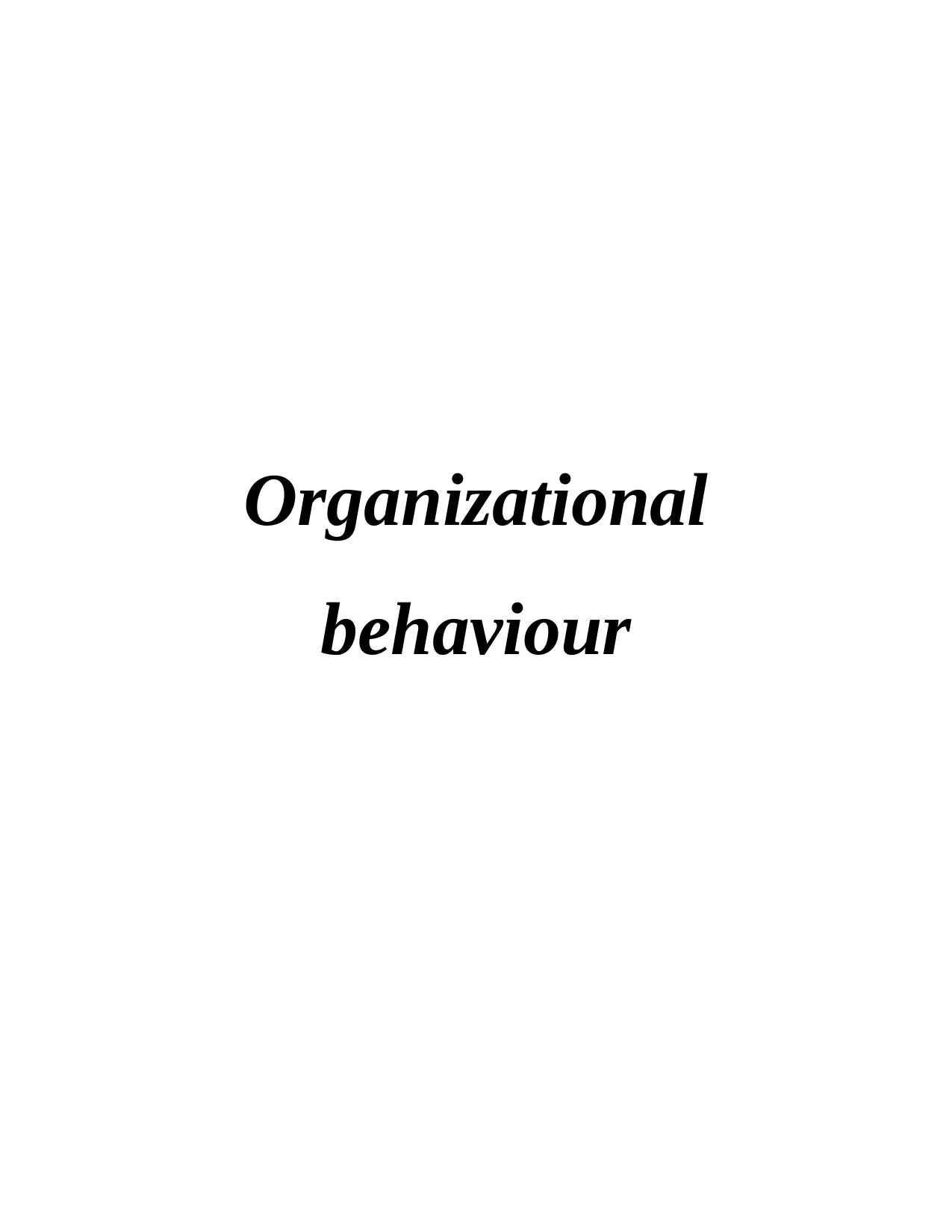
Organizational
behaviour
behaviour
Secure Best Marks with AI Grader
Need help grading? Try our AI Grader for instant feedback on your assignments.
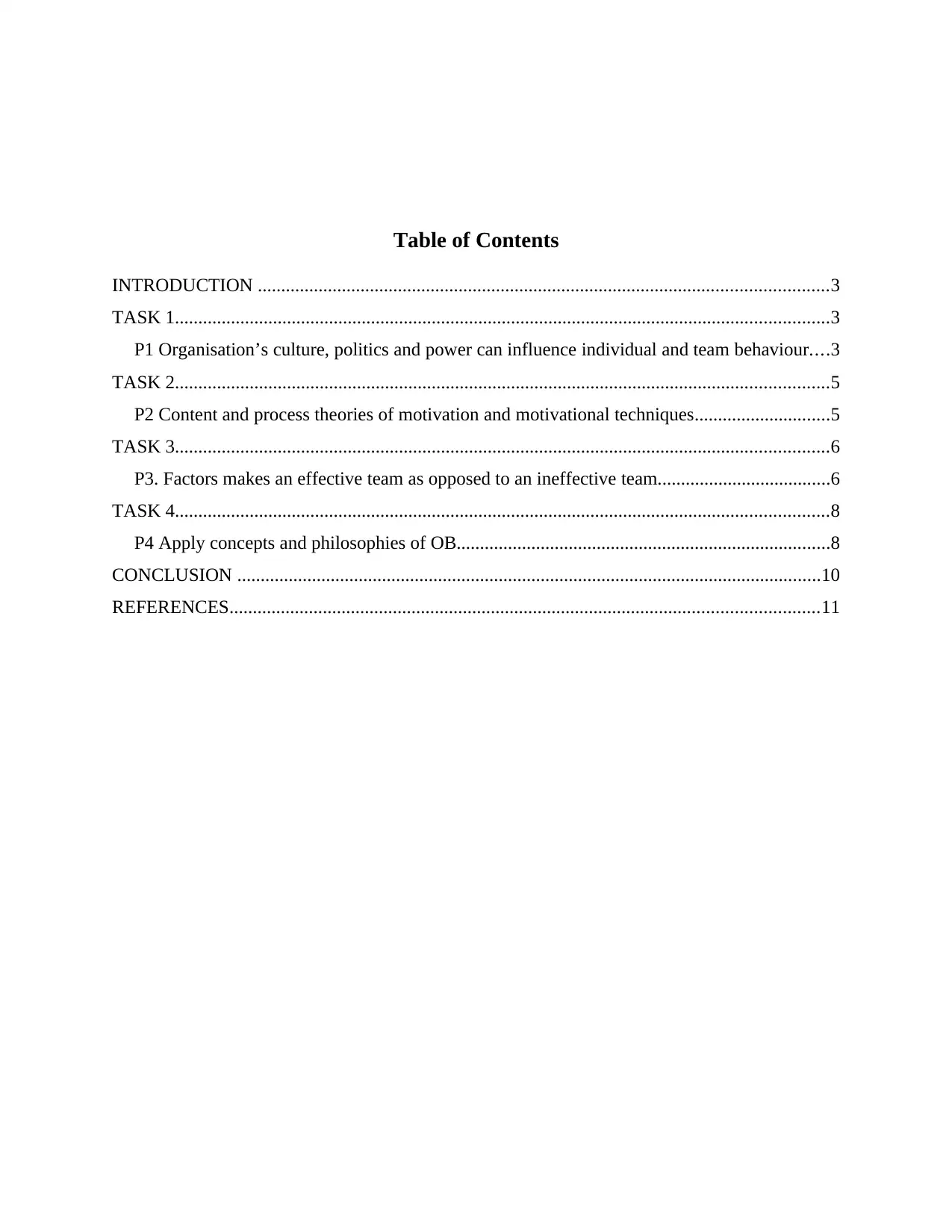
Table of Contents
INTRODUCTION ..........................................................................................................................3
TASK 1............................................................................................................................................3
P1 Organisation’s culture, politics and power can influence individual and team behaviour....3
TASK 2............................................................................................................................................5
P2 Content and process theories of motivation and motivational techniques.............................5
TASK 3............................................................................................................................................6
P3. Factors makes an effective team as opposed to an ineffective team.....................................6
TASK 4............................................................................................................................................8
P4 Apply concepts and philosophies of OB................................................................................8
CONCLUSION .............................................................................................................................10
REFERENCES..............................................................................................................................11
INTRODUCTION ..........................................................................................................................3
TASK 1............................................................................................................................................3
P1 Organisation’s culture, politics and power can influence individual and team behaviour....3
TASK 2............................................................................................................................................5
P2 Content and process theories of motivation and motivational techniques.............................5
TASK 3............................................................................................................................................6
P3. Factors makes an effective team as opposed to an ineffective team.....................................6
TASK 4............................................................................................................................................8
P4 Apply concepts and philosophies of OB................................................................................8
CONCLUSION .............................................................................................................................10
REFERENCES..............................................................................................................................11
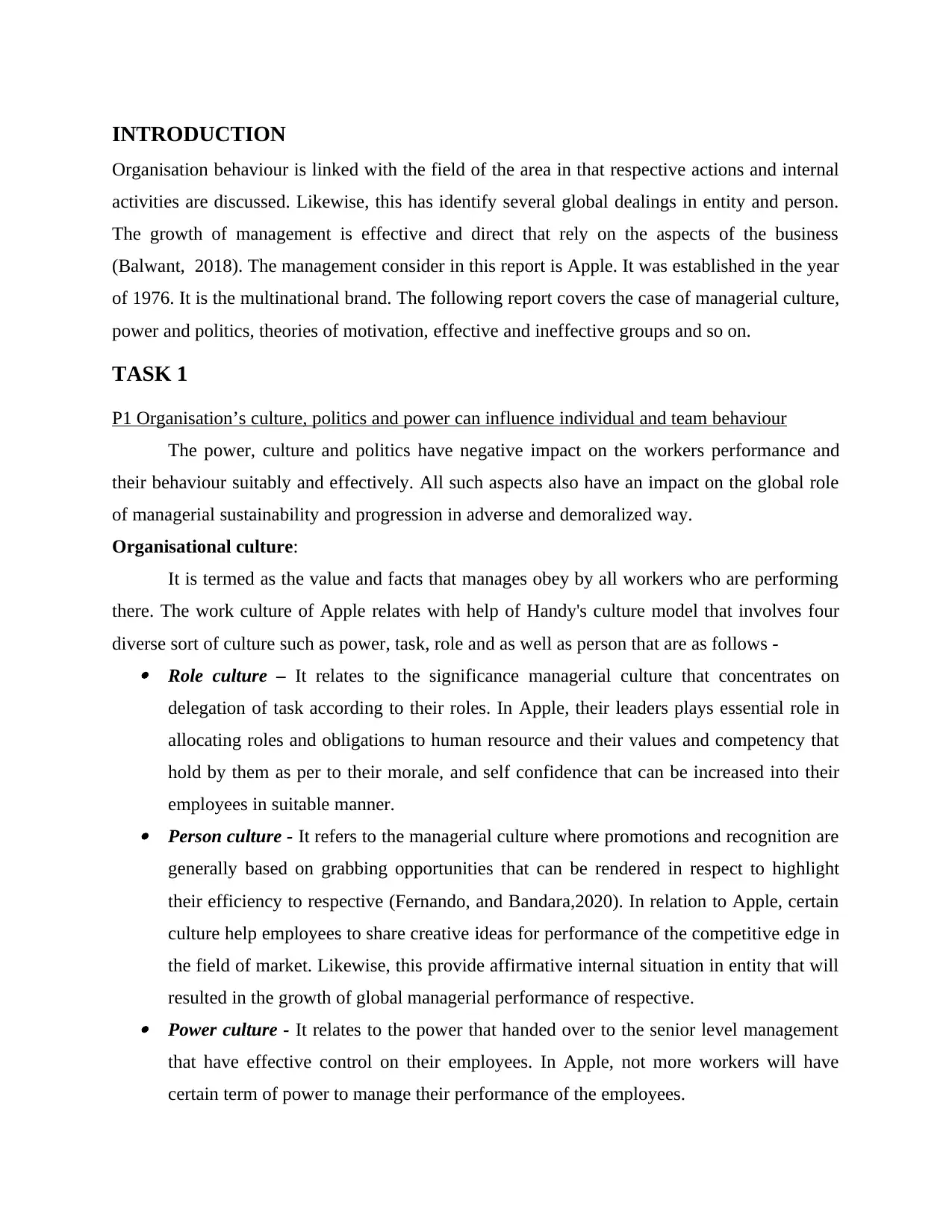
INTRODUCTION
Organisation behaviour is linked with the field of the area in that respective actions and internal
activities are discussed. Likewise, this has identify several global dealings in entity and person.
The growth of management is effective and direct that rely on the aspects of the business
(Balwant, 2018). The management consider in this report is Apple. It was established in the year
of 1976. It is the multinational brand. The following report covers the case of managerial culture,
power and politics, theories of motivation, effective and ineffective groups and so on.
TASK 1
P1 Organisation’s culture, politics and power can influence individual and team behaviour
The power, culture and politics have negative impact on the workers performance and
their behaviour suitably and effectively. All such aspects also have an impact on the global role
of managerial sustainability and progression in adverse and demoralized way.
Organisational culture:
It is termed as the value and facts that manages obey by all workers who are performing
there. The work culture of Apple relates with help of Handy's culture model that involves four
diverse sort of culture such as power, task, role and as well as person that are as follows - Role culture – It relates to the significance managerial culture that concentrates on
delegation of task according to their roles. In Apple, their leaders plays essential role in
allocating roles and obligations to human resource and their values and competency that
hold by them as per to their morale, and self confidence that can be increased into their
employees in suitable manner. Person culture - It refers to the managerial culture where promotions and recognition are
generally based on grabbing opportunities that can be rendered in respect to highlight
their efficiency to respective (Fernando, and Bandara,2020). In relation to Apple, certain
culture help employees to share creative ideas for performance of the competitive edge in
the field of market. Likewise, this provide affirmative internal situation in entity that will
resulted in the growth of global managerial performance of respective. Power culture - It relates to the power that handed over to the senior level management
that have effective control on their employees. In Apple, not more workers will have
certain term of power to manage their performance of the employees.
Organisation behaviour is linked with the field of the area in that respective actions and internal
activities are discussed. Likewise, this has identify several global dealings in entity and person.
The growth of management is effective and direct that rely on the aspects of the business
(Balwant, 2018). The management consider in this report is Apple. It was established in the year
of 1976. It is the multinational brand. The following report covers the case of managerial culture,
power and politics, theories of motivation, effective and ineffective groups and so on.
TASK 1
P1 Organisation’s culture, politics and power can influence individual and team behaviour
The power, culture and politics have negative impact on the workers performance and
their behaviour suitably and effectively. All such aspects also have an impact on the global role
of managerial sustainability and progression in adverse and demoralized way.
Organisational culture:
It is termed as the value and facts that manages obey by all workers who are performing
there. The work culture of Apple relates with help of Handy's culture model that involves four
diverse sort of culture such as power, task, role and as well as person that are as follows - Role culture – It relates to the significance managerial culture that concentrates on
delegation of task according to their roles. In Apple, their leaders plays essential role in
allocating roles and obligations to human resource and their values and competency that
hold by them as per to their morale, and self confidence that can be increased into their
employees in suitable manner. Person culture - It refers to the managerial culture where promotions and recognition are
generally based on grabbing opportunities that can be rendered in respect to highlight
their efficiency to respective (Fernando, and Bandara,2020). In relation to Apple, certain
culture help employees to share creative ideas for performance of the competitive edge in
the field of market. Likewise, this provide affirmative internal situation in entity that will
resulted in the growth of global managerial performance of respective. Power culture - It relates to the power that handed over to the senior level management
that have effective control on their employees. In Apple, not more workers will have
certain term of power to manage their performance of the employees.
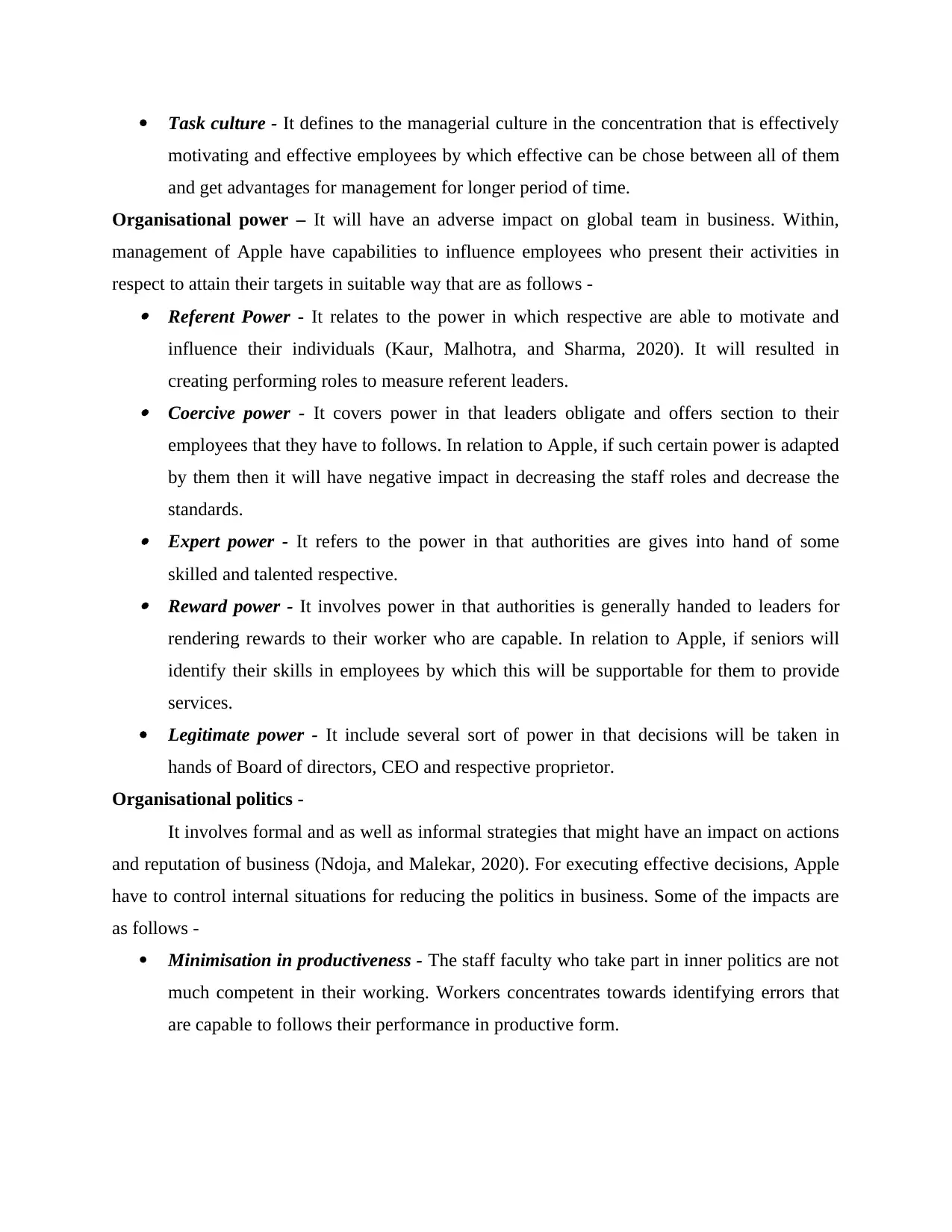
Task culture - It defines to the managerial culture in the concentration that is effectively
motivating and effective employees by which effective can be chose between all of them
and get advantages for management for longer period of time.
Organisational power – It will have an adverse impact on global team in business. Within,
management of Apple have capabilities to influence employees who present their activities in
respect to attain their targets in suitable way that are as follows - Referent Power - It relates to the power in which respective are able to motivate and
influence their individuals (Kaur, Malhotra, and Sharma, 2020). It will resulted in
creating performing roles to measure referent leaders. Coercive power - It covers power in that leaders obligate and offers section to their
employees that they have to follows. In relation to Apple, if such certain power is adapted
by them then it will have negative impact in decreasing the staff roles and decrease the
standards. Expert power - It refers to the power in that authorities are gives into hand of some
skilled and talented respective. Reward power - It involves power in that authorities is generally handed to leaders for
rendering rewards to their worker who are capable. In relation to Apple, if seniors will
identify their skills in employees by which this will be supportable for them to provide
services.
Legitimate power - It include several sort of power in that decisions will be taken in
hands of Board of directors, CEO and respective proprietor.
Organisational politics -
It involves formal and as well as informal strategies that might have an impact on actions
and reputation of business (Ndoja, and Malekar, 2020). For executing effective decisions, Apple
have to control internal situations for reducing the politics in business. Some of the impacts are
as follows -
Minimisation in productiveness - The staff faculty who take part in inner politics are not
much competent in their working. Workers concentrates towards identifying errors that
are capable to follows their performance in productive form.
motivating and effective employees by which effective can be chose between all of them
and get advantages for management for longer period of time.
Organisational power – It will have an adverse impact on global team in business. Within,
management of Apple have capabilities to influence employees who present their activities in
respect to attain their targets in suitable way that are as follows - Referent Power - It relates to the power in which respective are able to motivate and
influence their individuals (Kaur, Malhotra, and Sharma, 2020). It will resulted in
creating performing roles to measure referent leaders. Coercive power - It covers power in that leaders obligate and offers section to their
employees that they have to follows. In relation to Apple, if such certain power is adapted
by them then it will have negative impact in decreasing the staff roles and decrease the
standards. Expert power - It refers to the power in that authorities are gives into hand of some
skilled and talented respective. Reward power - It involves power in that authorities is generally handed to leaders for
rendering rewards to their worker who are capable. In relation to Apple, if seniors will
identify their skills in employees by which this will be supportable for them to provide
services.
Legitimate power - It include several sort of power in that decisions will be taken in
hands of Board of directors, CEO and respective proprietor.
Organisational politics -
It involves formal and as well as informal strategies that might have an impact on actions
and reputation of business (Ndoja, and Malekar, 2020). For executing effective decisions, Apple
have to control internal situations for reducing the politics in business. Some of the impacts are
as follows -
Minimisation in productiveness - The staff faculty who take part in inner politics are not
much competent in their working. Workers concentrates towards identifying errors that
are capable to follows their performance in productive form.
Secure Best Marks with AI Grader
Need help grading? Try our AI Grader for instant feedback on your assignments.
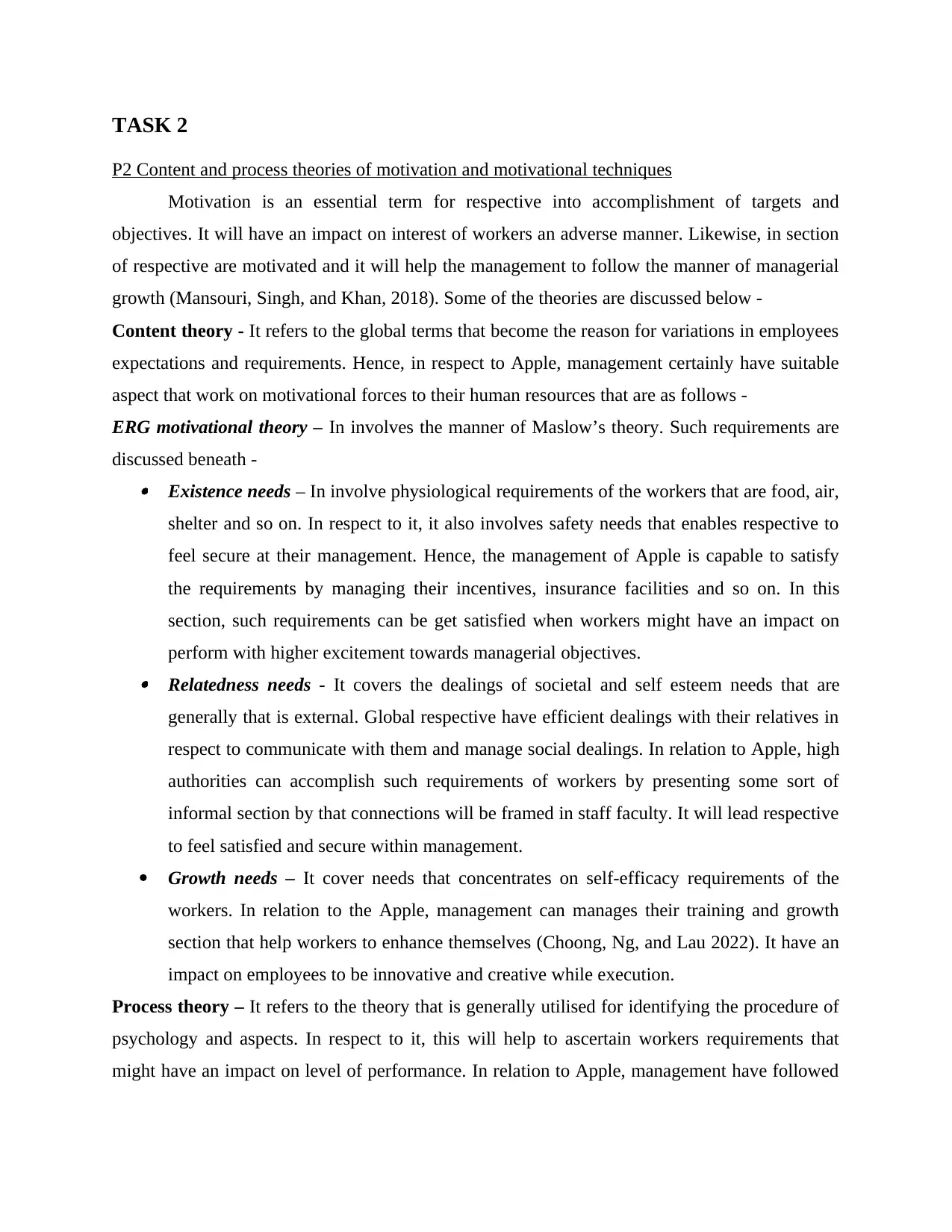
TASK 2
P2 Content and process theories of motivation and motivational techniques
Motivation is an essential term for respective into accomplishment of targets and
objectives. It will have an impact on interest of workers an adverse manner. Likewise, in section
of respective are motivated and it will help the management to follow the manner of managerial
growth (Mansouri, Singh, and Khan, 2018). Some of the theories are discussed below -
Content theory - It refers to the global terms that become the reason for variations in employees
expectations and requirements. Hence, in respect to Apple, management certainly have suitable
aspect that work on motivational forces to their human resources that are as follows -
ERG motivational theory – In involves the manner of Maslow’s theory. Such requirements are
discussed beneath - Existence needs – In involve physiological requirements of the workers that are food, air,
shelter and so on. In respect to it, it also involves safety needs that enables respective to
feel secure at their management. Hence, the management of Apple is capable to satisfy
the requirements by managing their incentives, insurance facilities and so on. In this
section, such requirements can be get satisfied when workers might have an impact on
perform with higher excitement towards managerial objectives. Relatedness needs - It covers the dealings of societal and self esteem needs that are
generally that is external. Global respective have efficient dealings with their relatives in
respect to communicate with them and manage social dealings. In relation to Apple, high
authorities can accomplish such requirements of workers by presenting some sort of
informal section by that connections will be framed in staff faculty. It will lead respective
to feel satisfied and secure within management.
Growth needs – It cover needs that concentrates on self-efficacy requirements of the
workers. In relation to the Apple, management can manages their training and growth
section that help workers to enhance themselves (Choong, Ng, and Lau 2022). It have an
impact on employees to be innovative and creative while execution.
Process theory – It refers to the theory that is generally utilised for identifying the procedure of
psychology and aspects. In respect to it, this will help to ascertain workers requirements that
might have an impact on level of performance. In relation to Apple, management have followed
P2 Content and process theories of motivation and motivational techniques
Motivation is an essential term for respective into accomplishment of targets and
objectives. It will have an impact on interest of workers an adverse manner. Likewise, in section
of respective are motivated and it will help the management to follow the manner of managerial
growth (Mansouri, Singh, and Khan, 2018). Some of the theories are discussed below -
Content theory - It refers to the global terms that become the reason for variations in employees
expectations and requirements. Hence, in respect to Apple, management certainly have suitable
aspect that work on motivational forces to their human resources that are as follows -
ERG motivational theory – In involves the manner of Maslow’s theory. Such requirements are
discussed beneath - Existence needs – In involve physiological requirements of the workers that are food, air,
shelter and so on. In respect to it, it also involves safety needs that enables respective to
feel secure at their management. Hence, the management of Apple is capable to satisfy
the requirements by managing their incentives, insurance facilities and so on. In this
section, such requirements can be get satisfied when workers might have an impact on
perform with higher excitement towards managerial objectives. Relatedness needs - It covers the dealings of societal and self esteem needs that are
generally that is external. Global respective have efficient dealings with their relatives in
respect to communicate with them and manage social dealings. In relation to Apple, high
authorities can accomplish such requirements of workers by presenting some sort of
informal section by that connections will be framed in staff faculty. It will lead respective
to feel satisfied and secure within management.
Growth needs – It cover needs that concentrates on self-efficacy requirements of the
workers. In relation to the Apple, management can manages their training and growth
section that help workers to enhance themselves (Choong, Ng, and Lau 2022). It have an
impact on employees to be innovative and creative while execution.
Process theory – It refers to the theory that is generally utilised for identifying the procedure of
psychology and aspects. In respect to it, this will help to ascertain workers requirements that
might have an impact on level of performance. In relation to Apple, management have followed
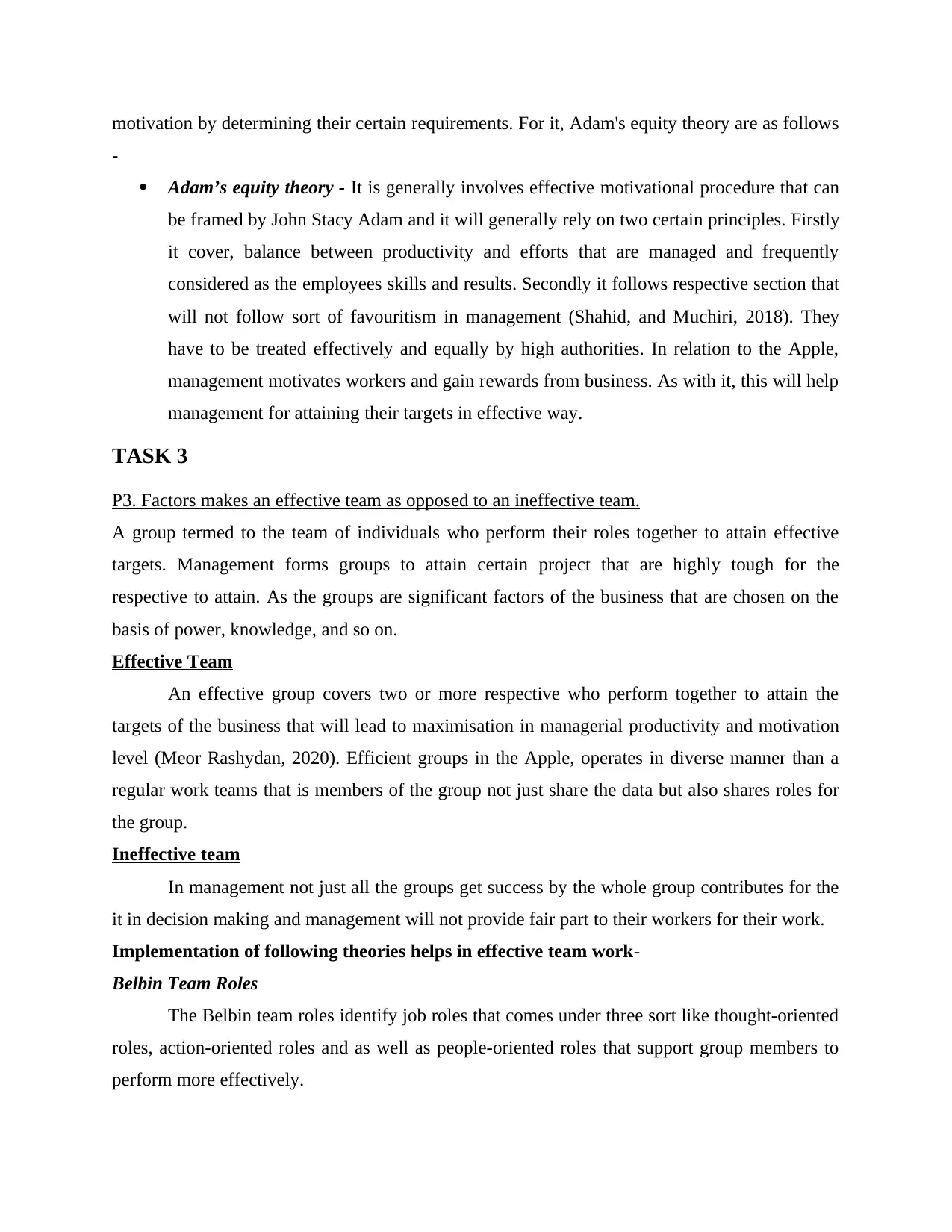
motivation by determining their certain requirements. For it, Adam's equity theory are as follows
-
Adam’s equity theory - It is generally involves effective motivational procedure that can
be framed by John Stacy Adam and it will generally rely on two certain principles. Firstly
it cover, balance between productivity and efforts that are managed and frequently
considered as the employees skills and results. Secondly it follows respective section that
will not follow sort of favouritism in management (Shahid, and Muchiri, 2018). They
have to be treated effectively and equally by high authorities. In relation to the Apple,
management motivates workers and gain rewards from business. As with it, this will help
management for attaining their targets in effective way.
TASK 3
P3. Factors makes an effective team as opposed to an ineffective team.
A group termed to the team of individuals who perform their roles together to attain effective
targets. Management forms groups to attain certain project that are highly tough for the
respective to attain. As the groups are significant factors of the business that are chosen on the
basis of power, knowledge, and so on.
Effective Team
An effective group covers two or more respective who perform together to attain the
targets of the business that will lead to maximisation in managerial productivity and motivation
level (Meor Rashydan, 2020). Efficient groups in the Apple, operates in diverse manner than a
regular work teams that is members of the group not just share the data but also shares roles for
the group.
Ineffective team
In management not just all the groups get success by the whole group contributes for the
it in decision making and management will not provide fair part to their workers for their work.
Implementation of following theories helps in effective team work-
Belbin Team Roles
The Belbin team roles identify job roles that comes under three sort like thought-oriented
roles, action-oriented roles and as well as people-oriented roles that support group members to
perform more effectively.
-
Adam’s equity theory - It is generally involves effective motivational procedure that can
be framed by John Stacy Adam and it will generally rely on two certain principles. Firstly
it cover, balance between productivity and efforts that are managed and frequently
considered as the employees skills and results. Secondly it follows respective section that
will not follow sort of favouritism in management (Shahid, and Muchiri, 2018). They
have to be treated effectively and equally by high authorities. In relation to the Apple,
management motivates workers and gain rewards from business. As with it, this will help
management for attaining their targets in effective way.
TASK 3
P3. Factors makes an effective team as opposed to an ineffective team.
A group termed to the team of individuals who perform their roles together to attain effective
targets. Management forms groups to attain certain project that are highly tough for the
respective to attain. As the groups are significant factors of the business that are chosen on the
basis of power, knowledge, and so on.
Effective Team
An effective group covers two or more respective who perform together to attain the
targets of the business that will lead to maximisation in managerial productivity and motivation
level (Meor Rashydan, 2020). Efficient groups in the Apple, operates in diverse manner than a
regular work teams that is members of the group not just share the data but also shares roles for
the group.
Ineffective team
In management not just all the groups get success by the whole group contributes for the
it in decision making and management will not provide fair part to their workers for their work.
Implementation of following theories helps in effective team work-
Belbin Team Roles
The Belbin team roles identify job roles that comes under three sort like thought-oriented
roles, action-oriented roles and as well as people-oriented roles that support group members to
perform more effectively.
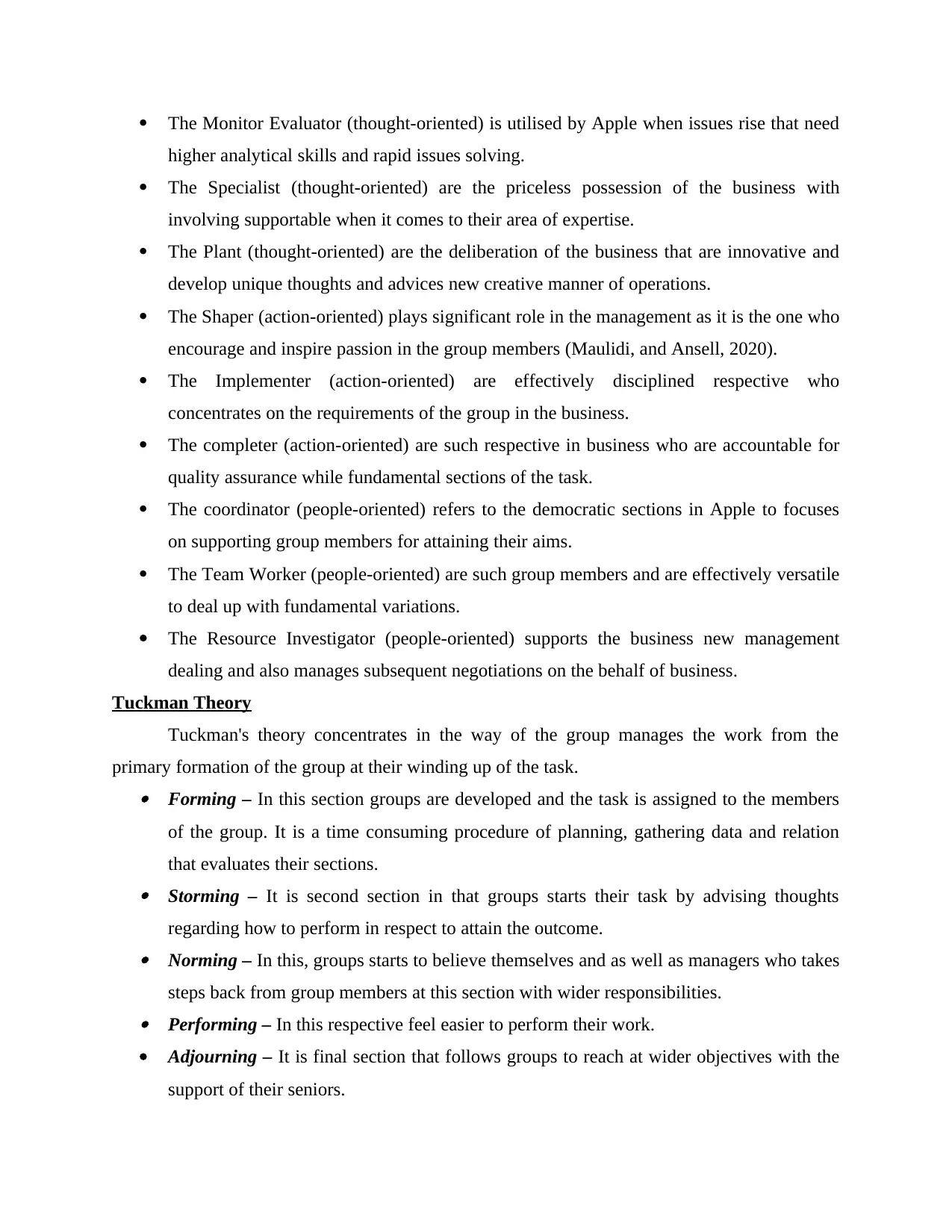
The Monitor Evaluator (thought-oriented) is utilised by Apple when issues rise that need
higher analytical skills and rapid issues solving.
The Specialist (thought-oriented) are the priceless possession of the business with
involving supportable when it comes to their area of expertise.
The Plant (thought-oriented) are the deliberation of the business that are innovative and
develop unique thoughts and advices new creative manner of operations.
The Shaper (action-oriented) plays significant role in the management as it is the one who
encourage and inspire passion in the group members (Maulidi, and Ansell, 2020).
The Implementer (action-oriented) are effectively disciplined respective who
concentrates on the requirements of the group in the business.
The completer (action-oriented) are such respective in business who are accountable for
quality assurance while fundamental sections of the task.
The coordinator (people-oriented) refers to the democratic sections in Apple to focuses
on supporting group members for attaining their aims.
The Team Worker (people-oriented) are such group members and are effectively versatile
to deal up with fundamental variations.
The Resource Investigator (people-oriented) supports the business new management
dealing and also manages subsequent negotiations on the behalf of business.
Tuckman Theory
Tuckman's theory concentrates in the way of the group manages the work from the
primary formation of the group at their winding up of the task. Forming – In this section groups are developed and the task is assigned to the members
of the group. It is a time consuming procedure of planning, gathering data and relation
that evaluates their sections. Storming – It is second section in that groups starts their task by advising thoughts
regarding how to perform in respect to attain the outcome. Norming – In this, groups starts to believe themselves and as well as managers who takes
steps back from group members at this section with wider responsibilities. Performing – In this respective feel easier to perform their work.
Adjourning – It is final section that follows groups to reach at wider objectives with the
support of their seniors.
higher analytical skills and rapid issues solving.
The Specialist (thought-oriented) are the priceless possession of the business with
involving supportable when it comes to their area of expertise.
The Plant (thought-oriented) are the deliberation of the business that are innovative and
develop unique thoughts and advices new creative manner of operations.
The Shaper (action-oriented) plays significant role in the management as it is the one who
encourage and inspire passion in the group members (Maulidi, and Ansell, 2020).
The Implementer (action-oriented) are effectively disciplined respective who
concentrates on the requirements of the group in the business.
The completer (action-oriented) are such respective in business who are accountable for
quality assurance while fundamental sections of the task.
The coordinator (people-oriented) refers to the democratic sections in Apple to focuses
on supporting group members for attaining their aims.
The Team Worker (people-oriented) are such group members and are effectively versatile
to deal up with fundamental variations.
The Resource Investigator (people-oriented) supports the business new management
dealing and also manages subsequent negotiations on the behalf of business.
Tuckman Theory
Tuckman's theory concentrates in the way of the group manages the work from the
primary formation of the group at their winding up of the task. Forming – In this section groups are developed and the task is assigned to the members
of the group. It is a time consuming procedure of planning, gathering data and relation
that evaluates their sections. Storming – It is second section in that groups starts their task by advising thoughts
regarding how to perform in respect to attain the outcome. Norming – In this, groups starts to believe themselves and as well as managers who takes
steps back from group members at this section with wider responsibilities. Performing – In this respective feel easier to perform their work.
Adjourning – It is final section that follows groups to reach at wider objectives with the
support of their seniors.
Paraphrase This Document
Need a fresh take? Get an instant paraphrase of this document with our AI Paraphraser
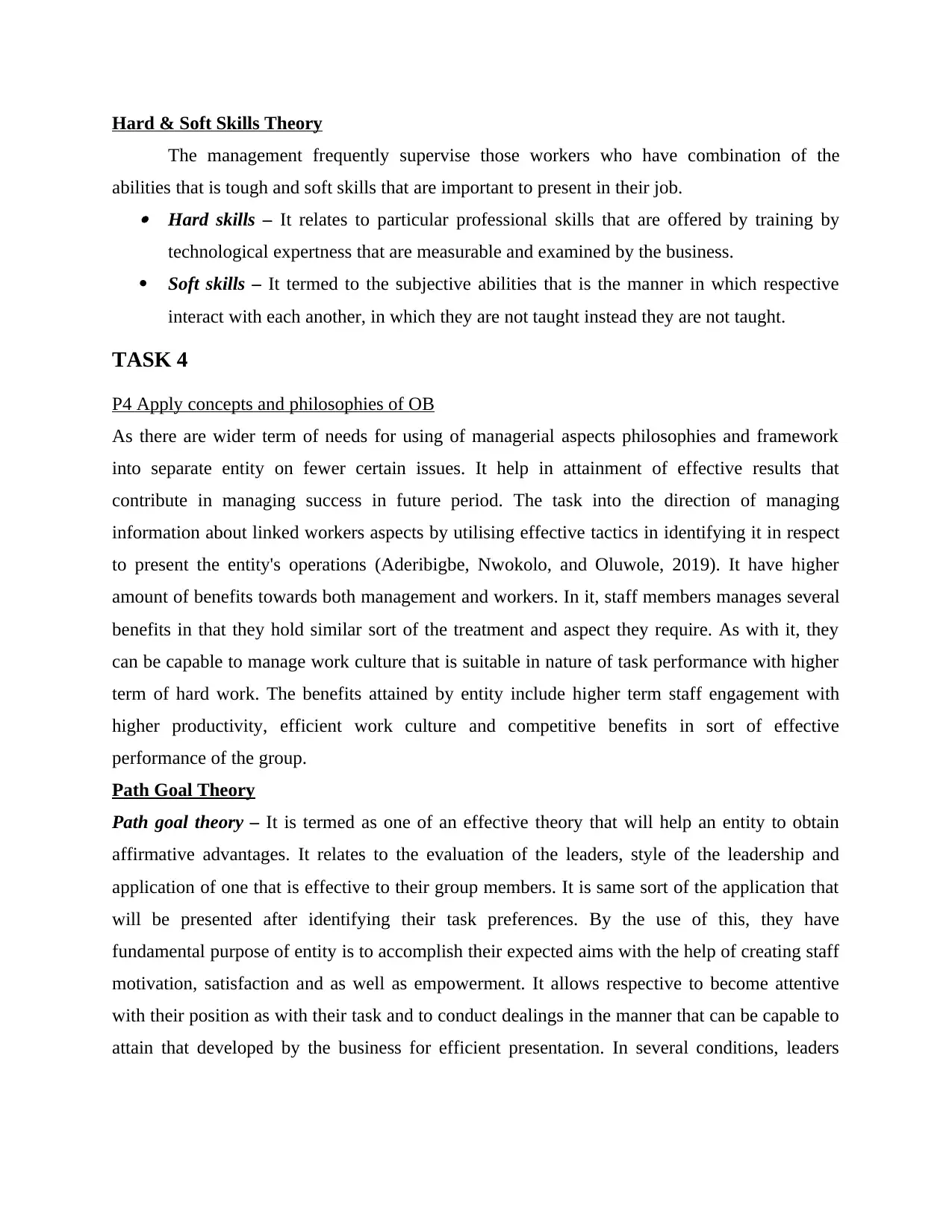
Hard & Soft Skills Theory
The management frequently supervise those workers who have combination of the
abilities that is tough and soft skills that are important to present in their job. Hard skills – It relates to particular professional skills that are offered by training by
technological expertness that are measurable and examined by the business.
Soft skills – It termed to the subjective abilities that is the manner in which respective
interact with each another, in which they are not taught instead they are not taught.
TASK 4
P4 Apply concepts and philosophies of OB
As there are wider term of needs for using of managerial aspects philosophies and framework
into separate entity on fewer certain issues. It help in attainment of effective results that
contribute in managing success in future period. The task into the direction of managing
information about linked workers aspects by utilising effective tactics in identifying it in respect
to present the entity's operations (Aderibigbe, Nwokolo, and Oluwole, 2019). It have higher
amount of benefits towards both management and workers. In it, staff members manages several
benefits in that they hold similar sort of the treatment and aspect they require. As with it, they
can be capable to manage work culture that is suitable in nature of task performance with higher
term of hard work. The benefits attained by entity include higher term staff engagement with
higher productivity, efficient work culture and competitive benefits in sort of effective
performance of the group.
Path Goal Theory
Path goal theory – It is termed as one of an effective theory that will help an entity to obtain
affirmative advantages. It relates to the evaluation of the leaders, style of the leadership and
application of one that is effective to their group members. It is same sort of the application that
will be presented after identifying their task preferences. By the use of this, they have
fundamental purpose of entity is to accomplish their expected aims with the help of creating staff
motivation, satisfaction and as well as empowerment. It allows respective to become attentive
with their position as with their task and to conduct dealings in the manner that can be capable to
attain that developed by the business for efficient presentation. In several conditions, leaders
The management frequently supervise those workers who have combination of the
abilities that is tough and soft skills that are important to present in their job. Hard skills – It relates to particular professional skills that are offered by training by
technological expertness that are measurable and examined by the business.
Soft skills – It termed to the subjective abilities that is the manner in which respective
interact with each another, in which they are not taught instead they are not taught.
TASK 4
P4 Apply concepts and philosophies of OB
As there are wider term of needs for using of managerial aspects philosophies and framework
into separate entity on fewer certain issues. It help in attainment of effective results that
contribute in managing success in future period. The task into the direction of managing
information about linked workers aspects by utilising effective tactics in identifying it in respect
to present the entity's operations (Aderibigbe, Nwokolo, and Oluwole, 2019). It have higher
amount of benefits towards both management and workers. In it, staff members manages several
benefits in that they hold similar sort of the treatment and aspect they require. As with it, they
can be capable to manage work culture that is suitable in nature of task performance with higher
term of hard work. The benefits attained by entity include higher term staff engagement with
higher productivity, efficient work culture and competitive benefits in sort of effective
performance of the group.
Path Goal Theory
Path goal theory – It is termed as one of an effective theory that will help an entity to obtain
affirmative advantages. It relates to the evaluation of the leaders, style of the leadership and
application of one that is effective to their group members. It is same sort of the application that
will be presented after identifying their task preferences. By the use of this, they have
fundamental purpose of entity is to accomplish their expected aims with the help of creating staff
motivation, satisfaction and as well as empowerment. It allows respective to become attentive
with their position as with their task and to conduct dealings in the manner that can be capable to
attain that developed by the business for efficient presentation. In several conditions, leaders
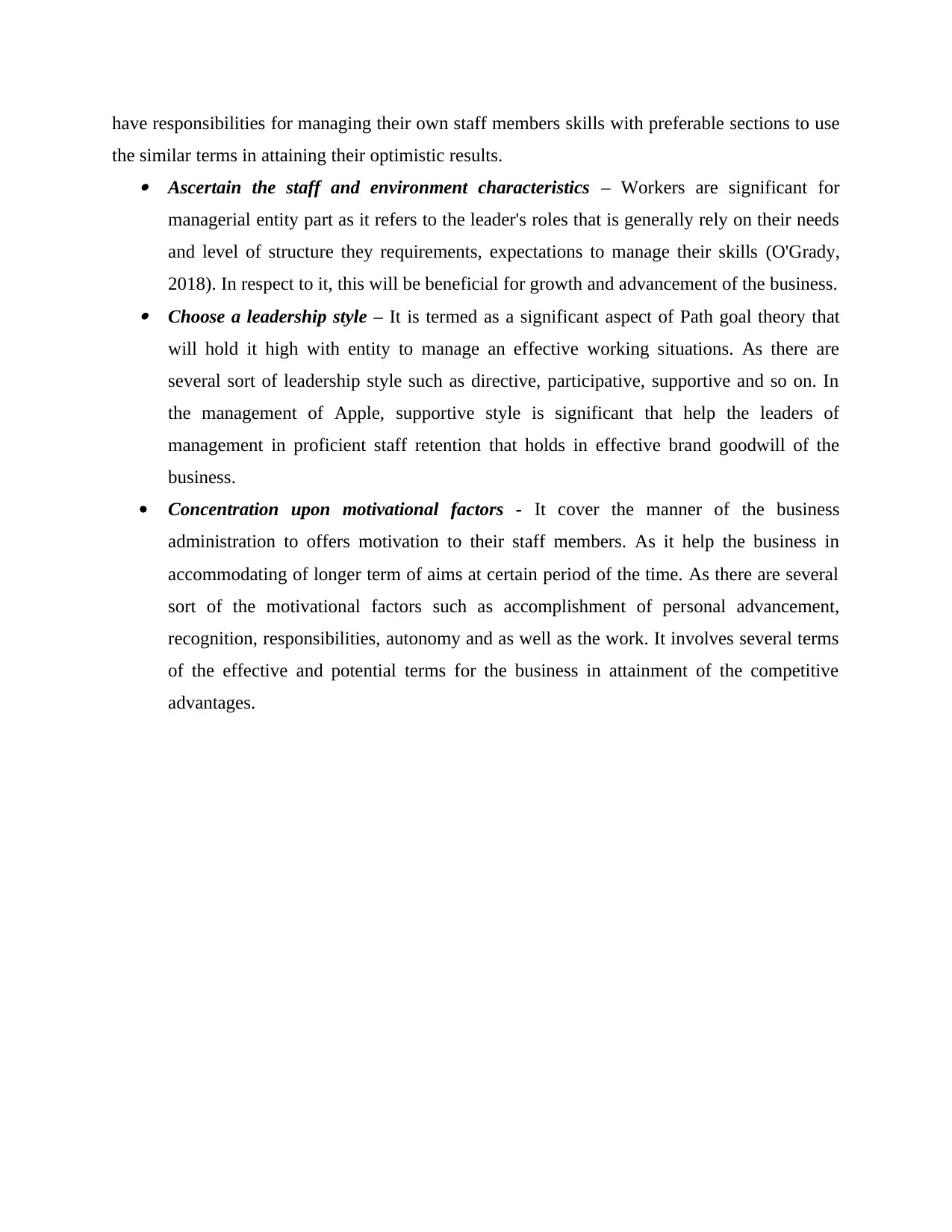
have responsibilities for managing their own staff members skills with preferable sections to use
the similar terms in attaining their optimistic results. Ascertain the staff and environment characteristics – Workers are significant for
managerial entity part as it refers to the leader's roles that is generally rely on their needs
and level of structure they requirements, expectations to manage their skills (O'Grady,
2018). In respect to it, this will be beneficial for growth and advancement of the business. Choose a leadership style – It is termed as a significant aspect of Path goal theory that
will hold it high with entity to manage an effective working situations. As there are
several sort of leadership style such as directive, participative, supportive and so on. In
the management of Apple, supportive style is significant that help the leaders of
management in proficient staff retention that holds in effective brand goodwill of the
business.
Concentration upon motivational factors - It cover the manner of the business
administration to offers motivation to their staff members. As it help the business in
accommodating of longer term of aims at certain period of the time. As there are several
sort of the motivational factors such as accomplishment of personal advancement,
recognition, responsibilities, autonomy and as well as the work. It involves several terms
of the effective and potential terms for the business in attainment of the competitive
advantages.
the similar terms in attaining their optimistic results. Ascertain the staff and environment characteristics – Workers are significant for
managerial entity part as it refers to the leader's roles that is generally rely on their needs
and level of structure they requirements, expectations to manage their skills (O'Grady,
2018). In respect to it, this will be beneficial for growth and advancement of the business. Choose a leadership style – It is termed as a significant aspect of Path goal theory that
will hold it high with entity to manage an effective working situations. As there are
several sort of leadership style such as directive, participative, supportive and so on. In
the management of Apple, supportive style is significant that help the leaders of
management in proficient staff retention that holds in effective brand goodwill of the
business.
Concentration upon motivational factors - It cover the manner of the business
administration to offers motivation to their staff members. As it help the business in
accommodating of longer term of aims at certain period of the time. As there are several
sort of the motivational factors such as accomplishment of personal advancement,
recognition, responsibilities, autonomy and as well as the work. It involves several terms
of the effective and potential terms for the business in attainment of the competitive
advantages.
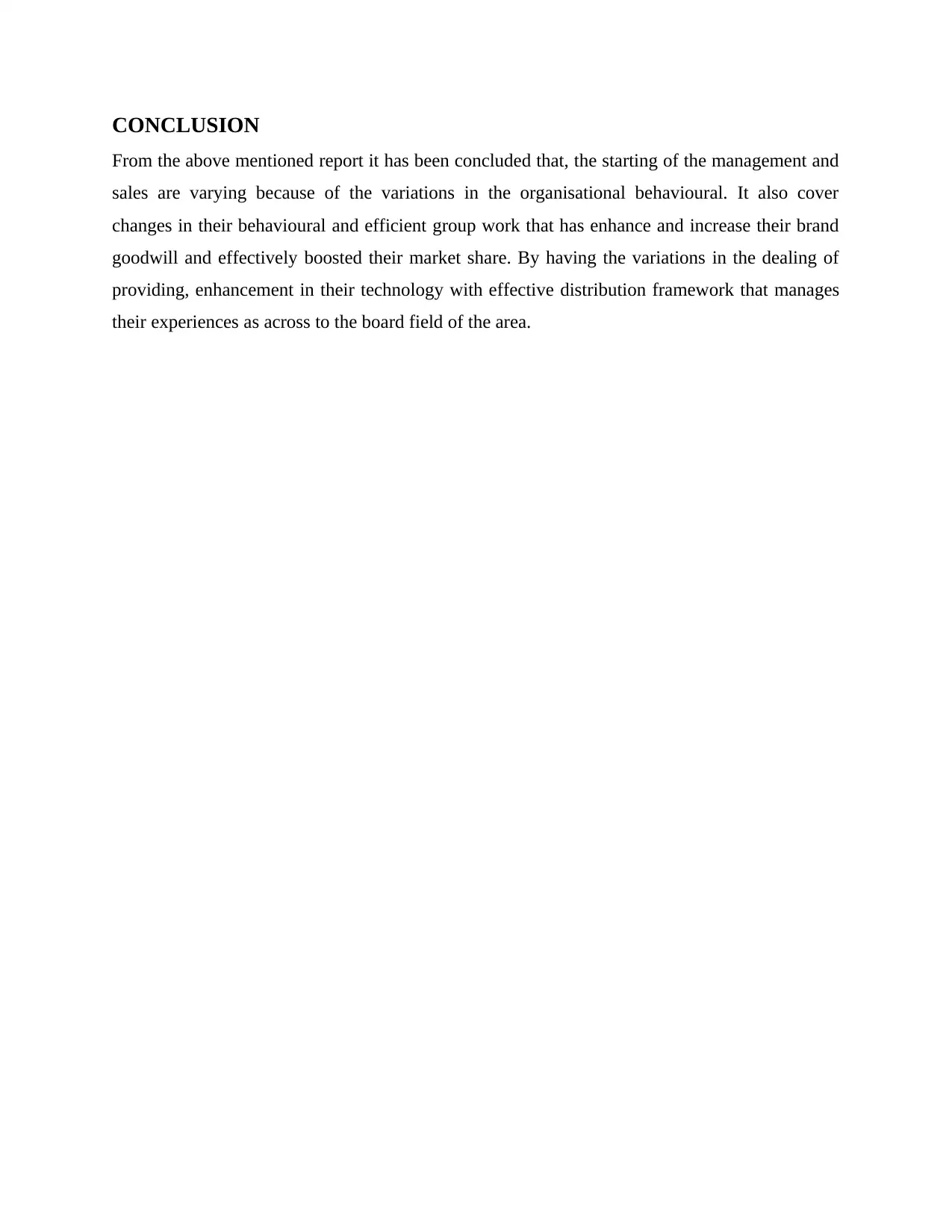
CONCLUSION
From the above mentioned report it has been concluded that, the starting of the management and
sales are varying because of the variations in the organisational behavioural. It also cover
changes in their behavioural and efficient group work that has enhance and increase their brand
goodwill and effectively boosted their market share. By having the variations in the dealing of
providing, enhancement in their technology with effective distribution framework that manages
their experiences as across to the board field of the area.
From the above mentioned report it has been concluded that, the starting of the management and
sales are varying because of the variations in the organisational behavioural. It also cover
changes in their behavioural and efficient group work that has enhance and increase their brand
goodwill and effectively boosted their market share. By having the variations in the dealing of
providing, enhancement in their technology with effective distribution framework that manages
their experiences as across to the board field of the area.
Secure Best Marks with AI Grader
Need help grading? Try our AI Grader for instant feedback on your assignments.
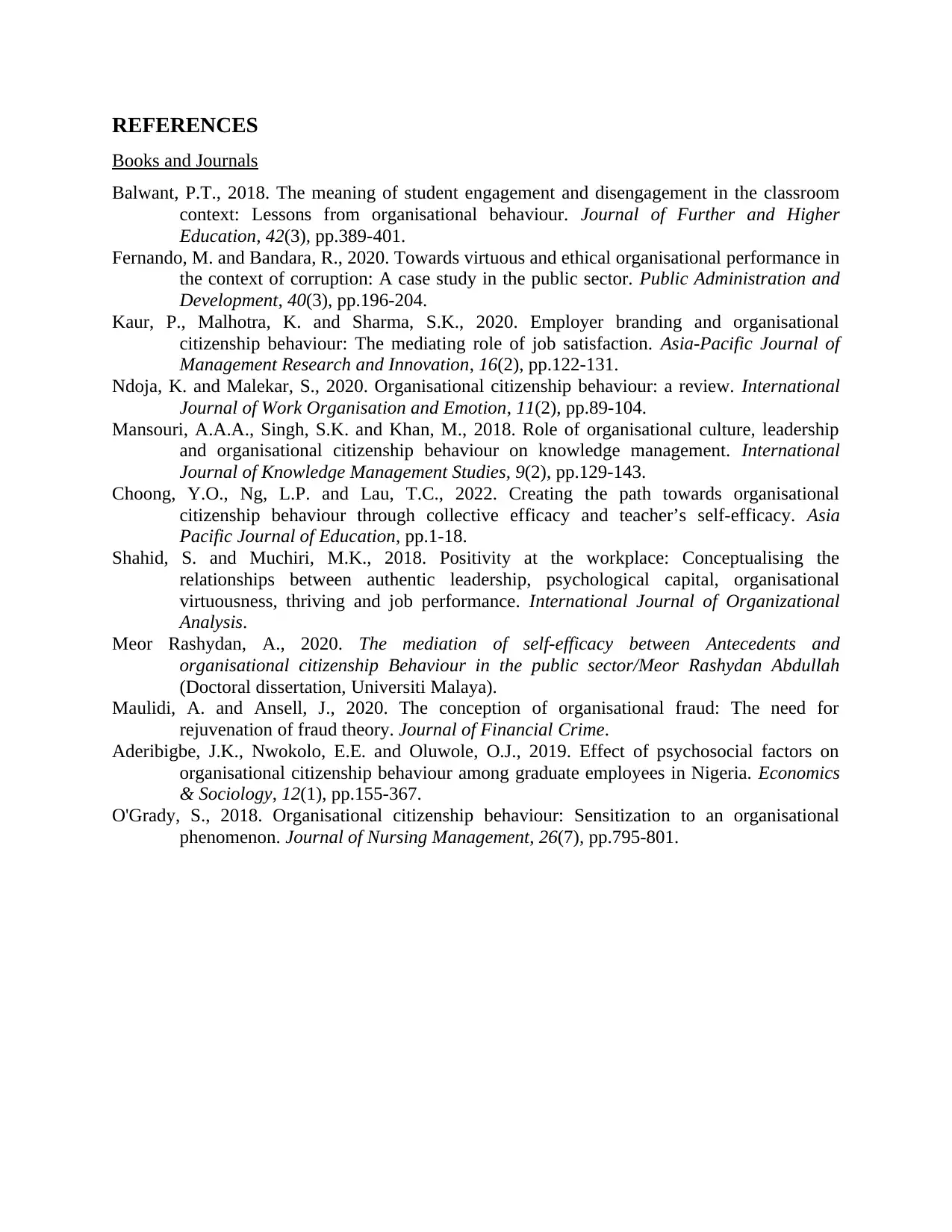
REFERENCES
Books and Journals
Balwant, P.T., 2018. The meaning of student engagement and disengagement in the classroom
context: Lessons from organisational behaviour. Journal of Further and Higher
Education, 42(3), pp.389-401.
Fernando, M. and Bandara, R., 2020. Towards virtuous and ethical organisational performance in
the context of corruption: A case study in the public sector. Public Administration and
Development, 40(3), pp.196-204.
Kaur, P., Malhotra, K. and Sharma, S.K., 2020. Employer branding and organisational
citizenship behaviour: The mediating role of job satisfaction. Asia-Pacific Journal of
Management Research and Innovation, 16(2), pp.122-131.
Ndoja, K. and Malekar, S., 2020. Organisational citizenship behaviour: a review. International
Journal of Work Organisation and Emotion, 11(2), pp.89-104.
Mansouri, A.A.A., Singh, S.K. and Khan, M., 2018. Role of organisational culture, leadership
and organisational citizenship behaviour on knowledge management. International
Journal of Knowledge Management Studies, 9(2), pp.129-143.
Choong, Y.O., Ng, L.P. and Lau, T.C., 2022. Creating the path towards organisational
citizenship behaviour through collective efficacy and teacher’s self-efficacy. Asia
Pacific Journal of Education, pp.1-18.
Shahid, S. and Muchiri, M.K., 2018. Positivity at the workplace: Conceptualising the
relationships between authentic leadership, psychological capital, organisational
virtuousness, thriving and job performance. International Journal of Organizational
Analysis.
Meor Rashydan, A., 2020. The mediation of self-efficacy between Antecedents and
organisational citizenship Behaviour in the public sector/Meor Rashydan Abdullah
(Doctoral dissertation, Universiti Malaya).
Maulidi, A. and Ansell, J., 2020. The conception of organisational fraud: The need for
rejuvenation of fraud theory. Journal of Financial Crime.
Aderibigbe, J.K., Nwokolo, E.E. and Oluwole, O.J., 2019. Effect of psychosocial factors on
organisational citizenship behaviour among graduate employees in Nigeria. Economics
& Sociology, 12(1), pp.155-367.
O'Grady, S., 2018. Organisational citizenship behaviour: Sensitization to an organisational
phenomenon. Journal of Nursing Management, 26(7), pp.795-801.
Books and Journals
Balwant, P.T., 2018. The meaning of student engagement and disengagement in the classroom
context: Lessons from organisational behaviour. Journal of Further and Higher
Education, 42(3), pp.389-401.
Fernando, M. and Bandara, R., 2020. Towards virtuous and ethical organisational performance in
the context of corruption: A case study in the public sector. Public Administration and
Development, 40(3), pp.196-204.
Kaur, P., Malhotra, K. and Sharma, S.K., 2020. Employer branding and organisational
citizenship behaviour: The mediating role of job satisfaction. Asia-Pacific Journal of
Management Research and Innovation, 16(2), pp.122-131.
Ndoja, K. and Malekar, S., 2020. Organisational citizenship behaviour: a review. International
Journal of Work Organisation and Emotion, 11(2), pp.89-104.
Mansouri, A.A.A., Singh, S.K. and Khan, M., 2018. Role of organisational culture, leadership
and organisational citizenship behaviour on knowledge management. International
Journal of Knowledge Management Studies, 9(2), pp.129-143.
Choong, Y.O., Ng, L.P. and Lau, T.C., 2022. Creating the path towards organisational
citizenship behaviour through collective efficacy and teacher’s self-efficacy. Asia
Pacific Journal of Education, pp.1-18.
Shahid, S. and Muchiri, M.K., 2018. Positivity at the workplace: Conceptualising the
relationships between authentic leadership, psychological capital, organisational
virtuousness, thriving and job performance. International Journal of Organizational
Analysis.
Meor Rashydan, A., 2020. The mediation of self-efficacy between Antecedents and
organisational citizenship Behaviour in the public sector/Meor Rashydan Abdullah
(Doctoral dissertation, Universiti Malaya).
Maulidi, A. and Ansell, J., 2020. The conception of organisational fraud: The need for
rejuvenation of fraud theory. Journal of Financial Crime.
Aderibigbe, J.K., Nwokolo, E.E. and Oluwole, O.J., 2019. Effect of psychosocial factors on
organisational citizenship behaviour among graduate employees in Nigeria. Economics
& Sociology, 12(1), pp.155-367.
O'Grady, S., 2018. Organisational citizenship behaviour: Sensitization to an organisational
phenomenon. Journal of Nursing Management, 26(7), pp.795-801.
1 out of 11
Related Documents
Your All-in-One AI-Powered Toolkit for Academic Success.
+13062052269
info@desklib.com
Available 24*7 on WhatsApp / Email
![[object Object]](/_next/static/media/star-bottom.7253800d.svg)
Unlock your academic potential
© 2024 | Zucol Services PVT LTD | All rights reserved.





